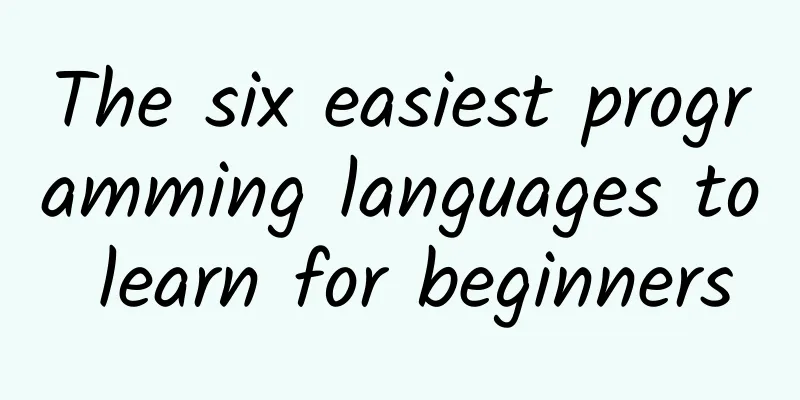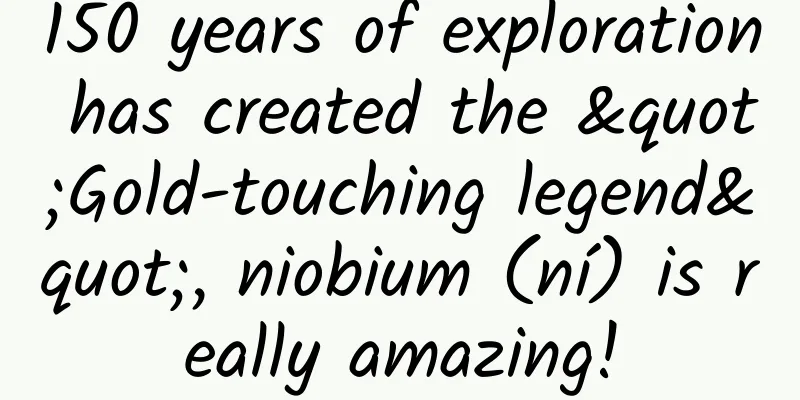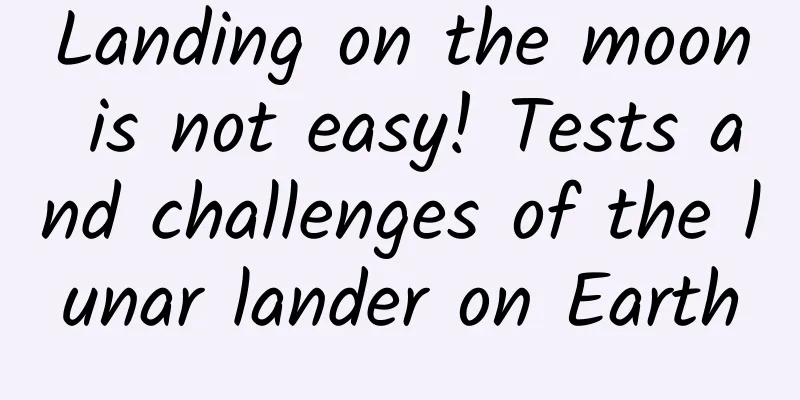The six easiest programming languages to learn for beginners

|
【51CTO.com Quick Translation】Learning programming may seem like a daunting task, but it is actually not as difficult as you might think. With a large number of resources available online, active communities, and many experts on social media, learning programming is much easier now than in the past, and even children can learn programming as quickly as possible. However, the key to learning programming is to find a suitable language. Here are six programming languages that are easiest for beginners to master. 1. JavaScript Don't confuse JavaScript with Java. Java is an object-oriented programming language that can be used to write cross-platform applications. Even to develop simple programs, objects must be designed; JavaScript is a literal scripting language that provides a very rich set of internal objects for designers to use. The reason why JS is so popular is that it is cross-platform. Since JS runs in the browser itself, you don't even need a compiler. You only need a notebook application or Sublime Text to write it. If you want to get into web development, JavaScript is an excellent entry-level language. JavaScript is a relatively forgiving and dynamically typed (weakly typed) programming language for beginners. In addition, JS syntax is similar to C syntax, so learning JS allows you to continue your studies in the field of programming, such as learning the more difficult programming language C++. However, some people, such as Matthew Mombrea, believe that JavaScript is actually a bad entry-level language. Mombrea believes that it is well known that JS is a bad example of object-oriented programming (OOP). In addition, although JS is a weakly typed language and helps to improve efficiency when programming, errors will not be discovered until runtime. He claims that if you want to make a career in software development, JavaScript is not a good place to start. But as an entry-level language to the world of programming, JS is still a good choice. use:
advantage:
shortcoming:
2. Ruby on Rails The biggest advantage of Ruby on Rails is that it is easy to read, which makes it easier for people with little programming experience to master. Ruby is a dynamic, object-oriented scripting language that is widely used in web development. Websites including Groupon and GitHub use Ruby on their backends. Ruby is easier to learn because you don't have to learn a lot of commands. Although Ruby is a framework, it is a collection of Ruby shortcuts, and many training courses teach Ruby on Rails. It's perfect for beginners, and as One Month points out, there are so many startups hiring Ruby on Rails developers that you can probably find a good job even if you only have entry-level experience. use:
advantage:
shortcoming:
3. Python
Python is also an entry-level programming language for beginners. Python can be used for web development applications and desktop applications. This dynamic language supports OOP programming, procedural programming, and functional programming. In addition, it is an open source language, which means it is free to get started and has a very active community. Joel Lee explains in detail why Python is useful (http://www.makeuseof.com/tag/reasons-python-programming-not-useless/). However, Python is a bit complex as an entry-level programming language. For example, it is important to maintain certain naming and indentation details. But considering its flexibility and large community, Python is still an easy programming language for beginners to learn. use:
advantage:
shortcoming:
4. Java Java is still one of the oldest programming languages. Java is the foundation of web applications, desktop programs, operating systems, and more. This object-oriented, class-based programming language is widely used; in addition, it is one of the most popular languages. However, despite its widespread use and popularity, Java is a bit more complex when compared to other entry-level languages. Java's syntax is largely derived from languages like C and C++, so many programming learning and intensive training courses start with C/C++ and then teach Java. If you are looking for some Java application examples? Why not check out these five websites (http://www.makeuseof.com/tag/top-5-websites-for-java-application-examples/). However, Java also forces programmers to think in terms of programs. Therefore, you have to think about how the computer processes information. Java is still a great programming language for beginners because it provides a solid foundation in analytical programming knowledge. use:
advantage:
shortcoming:
5.C/C++ C and C++ are both excellent introductory programming languages. In addition, with the help of these websites (http://www.makeuseof.com/tag/3-websites-started-learning-programming-language/), you can quickly get started with C and C++. If you're interested in game development, C++ is an excellent language to start with because it's often used to develop games and game engines in addition to web development applications, mobile applications, and desktop applications. Both C and C++ provide an introduction not just to programming, but to computer science as a whole. Even if you focus on other programming languages, the foundational knowledge provided by C/C++ is valuable. However, C++ can be challenging for beginners at first, but if you can overcome this difficulty, it will be very rewarding. use:
advantage:
shortcoming:
6. C# C# is a great choice for beginners. Startup time is fairly quick: just download Visual Studio Express and you'll get a full installation of all the necessary elements, such as SQL Express. C# can be used for a wide range of purposes, from web development to console applications. The syntax is based on C, so like C++ and C, it provides an excellent foundation for computer science. However, Visual Studio does have aspects such as auto-completion and automatically generated project files. C# can be complex, unlike languages like C and Ruby, which have multiple compilers and interpreters. But with its easy-to-use IDE and wide range of uses, C# is also a good choice for beginners to learn programming. use:
advantage:
shortcoming:
Conclusion HTML is not included in this article, and you may ask: why not introduce it? Considering that HTML is extremely easy to learn, it is often taught in many middle schools. In fact, HTML is also the first language I learned; in just a few hours, I went from a novice to a fairly advanced level. As many people know, HTML is a markup language, not a programming language. So, unfortunately, it does not fully meet this standard. However, HTML is applicable to a wide range of fields, so it is worth mentioning as a simple language (not a programming language) for beginners. HTML is widely used in web development, so you can learn CSS from it (like HTML, CSS is also not a real programming language), and finally learn standard programming languages like JavaScript. Which programming languages do you think are easiest for beginners? Feel free to leave a message to exchange ideas, and also feel free to tell us what your first language is. Original title: 6 Easiest Programming Languages to Learn for Beginners By Moe Long [Translated by 51CTO. Please indicate the original translator and source as 51CTO.com when reprinting on partner sites] |
<<: How to read and write Word doc/docx and PDF files in Android?
>>: Android freemarker template engine application
Recommend
Microsoft has earned more than $6 billion in patent fees through the Android platform
[[154452]] According to foreign media reports, Mi...
A collection of frequently asked questions about short video operations!
We always face many problems when making short vi...
Learn this operation skill, and it’s no problem to chat with 10 people at the same time
When dozens of users and dozens of WeChat groups n...
5 Steps to Write a Hot Article with 100,000+ Reads (Part 2)
The main thread of this article is the content and...
How does Tik Tok do content positioning? Share these 4 points!
If you don’t do a good job of content positioning...
If someone says you have a "dead fish face", it's probably not an insult...
From a broader perspective, the evolution of fish...
Can’t poop again? Don’t panic, Huaxi doctors say it’s that easy to poop easily!
The legs are all squatted into mosaics There'...
iOS Development - Abstract Protocol of App Architecture
From the perspective of architectural design, an ...
Domestic smart home market cools down: lack of models leads to capital waiting
In 2014, the concept of smart home seems to be be...
How good are the Chinese at planting trees?
The reporter learned from the National Forestry a...
Did the jujube tree at the netizen's grandmother's house suddenly go "crazy"? Is it contagious? The truth is actually like this!
Recently, many people have seen a video: a netize...
Tesla's entire range of models will see price hikes soon, with prices likely to rise by 8% on November 22
Recently, Tesla China staff said that due to the e...
Starting from scratch, what is the true meaning of content operation?
"Starting Operations from Scratch" is d...
Kuaishou’s 2021—How to create private domain traffic?
Simon Sinek, the best-selling author who proposed...
Niu Men's Fitness Series Courses from Beginner to Mastery Collection Baidu Cloud Download
A collection of Niu Men's Fitness Courses fro...





![RRS Enterprise Account: Everyone is a Marketing Treasure [WeChat Enterprise Account Case]](/upload/images/67ebf28b29564.webp)



